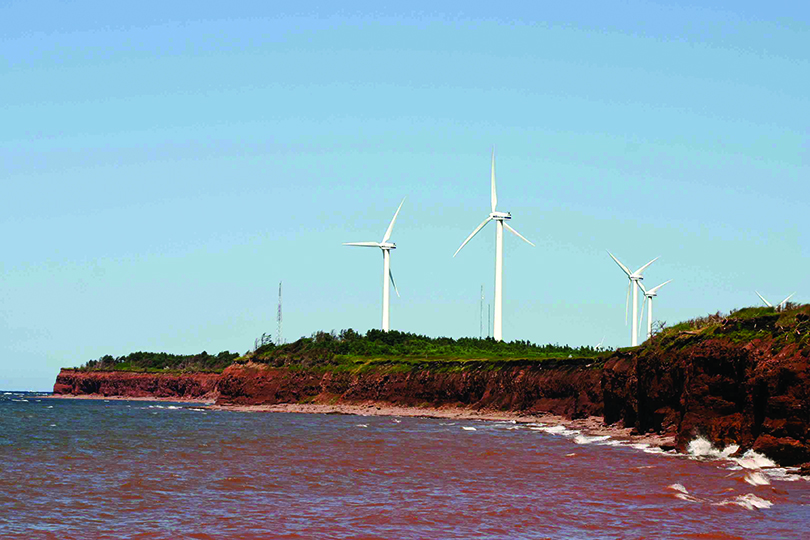UPEI researchers receive funding from provincial climate change fund

Three UPEI research projects have received funding through the Government of PEI’s Climate Change Challenge Fund.
The provincial government recently announced in a media release that 16 Island groups will receive over $1.48 million for projects designed “to help Islanders adapt to climate change, develop new technologies and opportunities, and reduce greenhouse emissions in innovative ways.”
Dr. Aitazaz Farooque, Industry Research Chair in Precision Agriculture, Faculty of Sustainable Design Engineering, received $99,500 from the Climate Challenge Fund for a project titled “Sustainable Agriculture Practices to Improve Crop Productivity and Mitigate Climate Change – Phase-II.”
Project summary: Organic soil amendments can enhance carbon sequestration, improve soil health, increase crop yield, and reduce greenhouse gas (GHG) emissions from agricultural soils. This project explores “community biodigesters” that use agricultural/aquaculture/forestry/community wastes to produce green energy and soil organic amendments. During Phase-I (ongoing) of this project, plot-scale trials are being conducted to choose the best soil amendment among biodigestate and biochar. During Phase-II (the current proposal), different application rates of the best soil amendment will be evaluated to formulate agricultural management practices for economically viable and environmentally friendly potato production in Atlantic Canada with goals of addressing climate change and adaptation issues relating to agriculture, such as GHG emissions and poor soil health with low soil organic matter (SOM). The project aims at formulating sustainable agricultural practices that adapt to climate change, improve soil health by increasing its SOM and increase carbon sequestration and potato yield without deteriorating the environment.
Dr. Jürgen Krause, Centre for Health and Community Research, Faculty of Business, received $100,000 from the fund for a project titled “Engaging Islanders in mapping climate-related social and health factors to build resilience to climate change on PEI.”
Project summary: Engaging Islanders in mapping climate-related social and health factors is necessary to build resilience to climate change. Communities facing health and social challenges are the first affected and the hardest hit by our changing climate. Challenges such as poverty, marginalization, inadequate housing, poor health status, and lack of access to services must be addressed to develop effective climate adaptation plans. The CCRA highlights the need for quantitative data to better understand the differential impacts of climate-related risks and facilitate a coordinated cross-sectoral response. Our project will engage the public and decision-makers to explore the use of high-quality data to identify populations that disproportionately experience the negative impacts of climate change and determine the best way to visualize the results for public use. The process and outcomes of this project will empower community members to adapt to the changing climate and build more resilient communities together.
Drs. Grant McSorley and Amy Hsiao, Faculty of Sustainable Design Engineering, received $97,300 from the Climate Challenge Fund, $5,000 and in-kind support from the Wind Energy Institute of Canada, and in-kind support from the PEI Energy Corporation and the City of Summerside for a project titled “Life Cycle Assessment and Asset Integrity Management of Wind Turbines.”
Project summary: Wind turbines are a critical element for our transition to renewable energy technology systems (RETS) and the reduction of Prince Edwards Island’s climate footprint. This project focuses on the life cycle sustainability assessment (LCSA) of multiple scenarios as wind turbines approach their end-of-life, and will communicate the benefit that RETS have on reducing our contribution to global warming from energy consumption and carbon emissions. We will be working with the Wind Energy Institute of Canada (WEICan) to examine the case for the sustainable extension of the operational life of wind turbines installed in 2013 as they approach the typical 20-year lifetime. We will also examine how stakeholder engagement integrates into decision-making when considering the sustainability of large-scale engineering initiatives. Prince Edward Island leads the country in percentage of wind energy contribution to the grid and can set an example by including stakeholders in the strategic and sustainable management of RETS.
“On behalf of UPEI, I congratulate Drs. Farooque, Krause, McSorley, and Hsiao on their success in receiving this funding,” said Dr. Katherine Gottschall-Pass, interim vice-president academic and research at UPEI. “Climate change affects so many areas of our lives—from the physical environment to our health and well-being. These projects will add a great deal to our knowledge about climate change and our ability to mitigate its impact.”